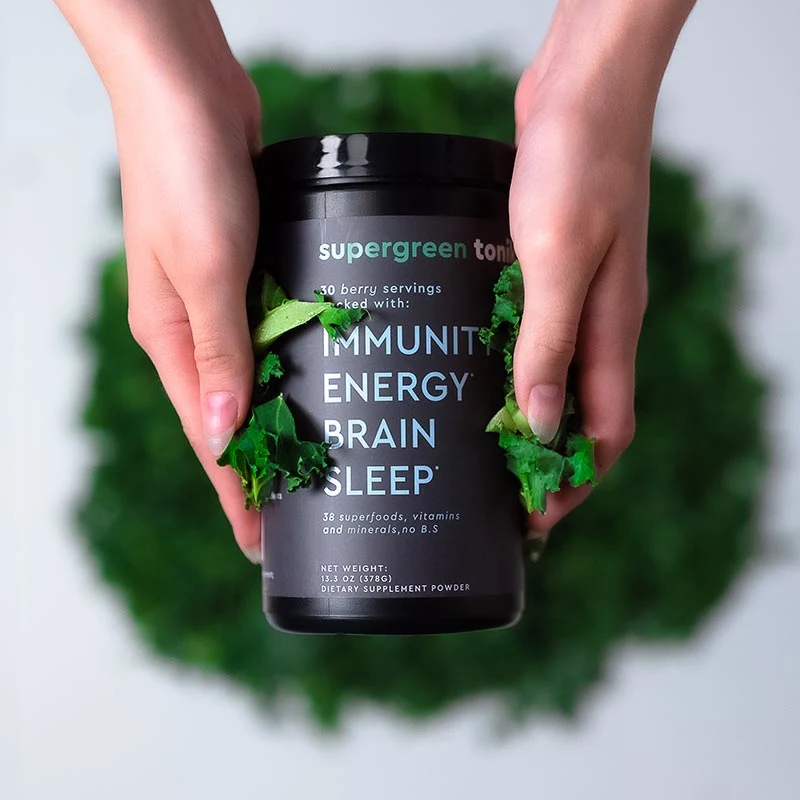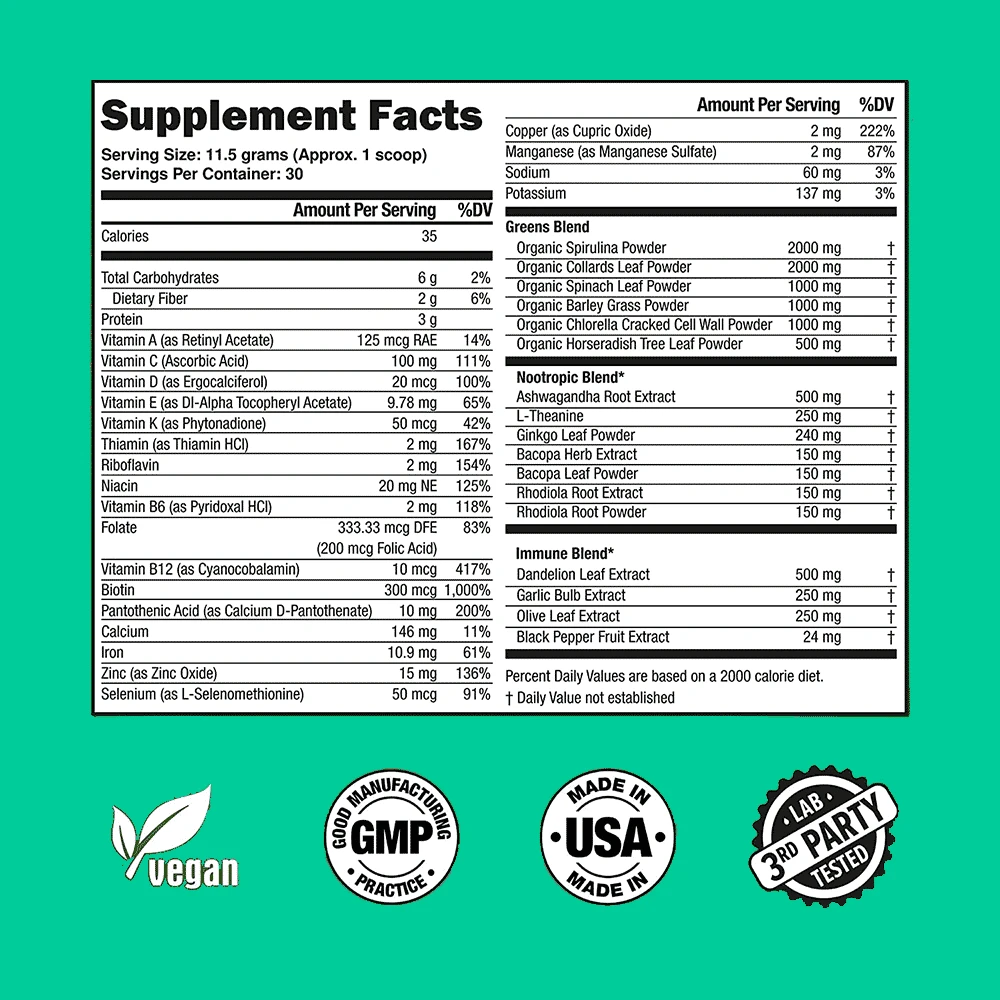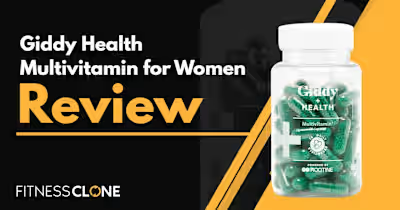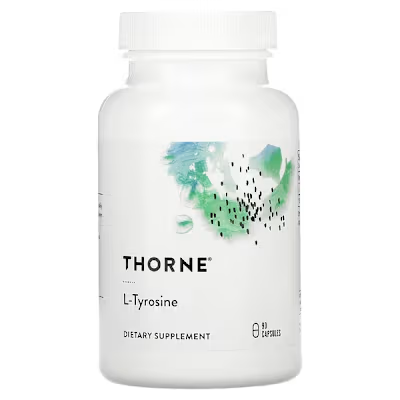Vitamin Absorption

Vitamins and nutrition supplements on spoon
While it is no secret that vitamins are good for you, you might still have questions about how to maximize your vitamin absorption. This article covers everything you need to know about taking vitamins and getting the most benefit from your vitamin routine.
Key Takeaways
Vitamins are organic compounds that the body needs in small amounts to perform a range of bodily functions.
Vitamin absorption rates vary depending on the type and form of the vitamin, the time it was taken, and whether it was taken with other ingredients. Knowing the best way and time to take specific vitamins can enhance their effectiveness.
Taking a liquid or powder supplement like a greens powder is a great way to meet your nutritional needs while benefiting your overall health.
Vitamin deficiency is more common than you might think. Despite having ample access to a wide variety of foods, nearly 10% of people in the United States are not getting their required vitamin intake. (Source)
A major contributing factor to this trend is the consumption of processed foods rather than whole, plant-based foods where vitamins are naturally found. This is where taking a multivitamin can be helpful.
This article answers frequently asked questions about vitamins, including how to absorb vitamins better and ways to increase your vitamin intake.
What Are Vitamins?
Before we get into it, you might be wondering, what are vitamins, and why are they important?
Vitamins, also called micronutrients, are organic compounds that the body needs in small amounts. They each play a unique role in keeping the body healthy and carrying out bodily functions. (Source)
Vitamins can be fat-soluble or dissolvable in water. There are thirteen different kinds, including:
Vitamin A
Vitamin B1
Vitamin B2
Vitamin B3
Vitamin B5
Vitamin B6
Vitamin B7
Vitamin B9
Vitamin C
Vitamin E
Vitamin K
Vitamins are critical to our overall health. Not getting enough vitamins in your day-to-day diet can cause various physical and mental symptoms and increase your risk of certain illnesses.
The best way to meet your recommended vitamin intake is through your diet. Green leafy vegetables, fruits, whole grains, fatty fish, and lean meats are all good sources of vitamins.
Taking a multivitamin or supplement is also a good way to meet your vitamin needs.
Vitamin Absorption
There is often a difference between the vitamin dose listed on a supplement label and the dose you actually get when taking the supplement.
This is because a vitamin is potent and best absorbed in its natural form. When a vitamin is changed from its natural form, its absorption rate will also change.
If you are wondering what percentage of a multivitamin is absorbed, there is unfortunately no clear-cut answer for you.
However, having general knowledge about the absorption rate of specific vitamins can help you maximize your vitamin routine and help you get the most out of your vitamin supplements.
What Is The Absorption Rate Of Vitamins?
It is difficult to pinpoint the exact absorption rate of vitamins as it is dependent on so many factors.
A person’s individual diet, digestive system, medical history, and medication intake can all influence how well their body absorbs vitamins.
That being said, the biggest factors determining vitamin absorption rates are the type of vitamin consumed and whether it is taken in pill, liquid, or powder form.
A vitamin must be able to quickly disintegrate in the stomach after entering the body for it to be absorbed.
However, many companies add fillers or wax coatings to their pill supplements to make them taste better and extend their shelf life. While these additions might seem like perks to consumers, in reality, they make it difficult for the vitamin to be broken down in the body.
In these cases, the vitamin might not disintegrate in time to reach the small intestine and be absorbed by the body. This means customers are spending money on supplements that provide little to no benefit. It is not unusual for only 10 to 20 percent of a vitamin in pill form to make it to the bloodstream.
Liquid and powder vitamins offer better absorption rates because they do not need to be broken down by the body in the same way pill supplements do. They dissolve quickly so that, once consumed, the digestive system can start extracting its nutrients and you can reap the benefits sooner.
Where are vitamins best absorbed?
All vitamins are absorbed in the small intestine. They are taken by mouth, broken down in the stomach, and then sent to the small intestine to be absorbed.
That being said, the way certain vitamins are absorbed and stored in the body can differ.
If you are wondering how long vitamins stay in your system, you should know the two types of vitamins:
fat-soluble
water-soluble
Fat-soluble vitamins, which include vitamins A, K, D, and E, must dissolve in fat before being absorbed by the body. Because of this, they stay in the body longer than other vitamins and do not need to be taken every day. In fact, overconsumption of fat-soluble vitamins can cause an unhealthy build-up in your system.
Water-soluble vitamins, which include vitamins B and C, dissolve in water. They are first picked up in the jejunum, a section of the small intestine, then dropped off by active transports at points of the body where they can enter the bloodstream. They are not easily stored and pass through urine, so you need to replenish your water-soluble vitamins each day.
How Do I Make Sure My Vitamins Are Absorbed?
There are a few things you can do if you are wondering how to absorb vitamins better or optimize your supplement routine.
First, it is important to know the difference between fat-soluble vitamins and water-soluble vitamins and take them accordingly.
Taking a fat-soluble supplement with dietary fats can help the vitamin be absorbed better in the digestive tract. Moreover, taking water-soluble vitamins every day can ensure that your body meets its nutritional needs and avoids deficiency.
Second, it is best to opt for a powder or liquid supplement when you are able. Doing so can ensure your vitamin is successfully absorbed by the body.
If there are only pill supplements available, look for options that are free from fillers or wax coatings. This can increase your chances of a high absorption rate.
Lastly, pairing certain vitamins with each other or additional ingredients can either enhance or hinder their effectiveness and absorption rate.
For example, research shows that fat-soluble vitamins are absorbed better when taken with fat like nuts or an avocado. On the other hand, chronic alcohol consumption has been shown to hinder the absorption of vitamin B9. (Source)
There are vitamin absorption charts available that break down when and with what each vitamin should be taken. Familiarizing yourself with a vitamin absorption chart can help you get the most from your supplement routine.
When To Take Vitamins
Vitamins are widely debated when it comes to what kinds to take and how often to take them. While the best time to take vitamins will depend on the person, there are some general guidelines you can follow.
Because they pass through urine, it is best to take water-soluble vitamins every day. This ensures that you reach your recommended vitamin intake and that your body can optimally carry out its essential functions.
When it comes to taking fat-soluble vitamins, once a week should be sufficient. Taking fat-soluble vitamins once a week ensures you are getting enough in your system without risking a build-up.
Moreover, fat-soluble vitamins work best when taken with food, preferably a fat like avocado, nuts, or olive oil. Water-soluble vitamins generally work better when taken on an empty stomach.
That being said, these are again just general guidelines that you can choose to build your supplement routine around. What works best for you should be customized to your schedule and health needs.
What Vitamins Should You Not Take Together?
Just as pairing certain vitamins can increase their effectiveness, there are some vitamins that should not be taken together.
For example, vitamins B12 and C interfere with each other and should not be taken together. Research shows that large amounts of vitamin C can hinder the body’s ability to absorb and metabolize vitamin B12. (Source)
Fat-soluble vitamins do not pair well with water-soluble vitamins because they are absorbed differently in the body and can cause digestive upset if taken on an empty stomach.
Moreover, taking large doses of minerals can cause them to compete with each other, which interferes with their absorption. Due to this, it is best to avoid taking zinc, calcium, and magnesium together.
Still, you can pair magnesium with vitamin D, as it has been shown to enhance its absorption and effectiveness. (Source)
Is It Okay To Take All Vitamins At The Same Time?
While not recommended, you can technically take all of your vitamins at the same time.
There is no evidence that suggests taking vitamins together within their recommended doses can cause adverse effects in otherwise healthy individuals.
However, this way of taking vitamins is not ideal. Not only can it cause digestive upset and increase your risk of consuming toxic doses, but it can also interfere with your vitamin absorption.
For example, fat-soluble vitamins work better when taken with food, while water-soluble vitamins do not. Taking them together, especially on an empty stomach, can decrease their effectiveness and cause unpleasant symptoms.
Spacing out your vitamin intake throughout the day can help you avoid any adverse side effects and increase their absorption rates.
How Long Should You Wait Between Taking Different Vitamins?
There is no set amount of time you should wait between taking different vitamins. In general, you want to give your body enough time to digest certain vitamins before adding new ones into your system.
For example, it is best to wait two hours between taking vitamins B12 and C to avoid any absorption interference.
Taking fat-soluble and water-soluble vitamins at different times of the day can give your body time to reset and avoid any adverse side effects.

Hands holding Supergreen Tonik and Kale
10% OFF with code:
BEST10
How To Increase Your Vitamin Intake
While the best way to increase your vitamin intake is by eating a vitamin-rich diet, taking a multivitamin or supplement can help you bridge nutritional gaps and ensure your body is getting all the nutrients it needs.
Vitamin supplements may be more beneficial for certain groups. People who have specific nutritional deficiencies, allergies, malabsorption conditions, food restrictions, or otherwise limited access to nutrient-rich foods could benefit from vitamin supplementation.
Moreover, pregnant and breastfeeding women or people who follow a vegan or vegetarian diet can use a supplement to help meet their nutritional needs.
Multivitamins and vitamins are easy ways to boost your vitamin intake. Individual vitamins work to treat a specific deficiency, while multivitamins can cover your bases and increase your overall vitamin intake.
Whether you choose a multivitamin or individual vitamin will depend on your health goals.
Supplements like green powders can help you meet your vitamin intake while providing various additional health benefits.
Our Supergreen Tonik contains a unique blend of minerals, fibres, adaptogens, probiotics, and digestive enzymes that are difficult to get in your diet and can ensure your body functions at its best.
Supergreen Tonik is also third-party tested and offers full ingredient transparency with its proprietary-free blends.

Supergreen Tonik ingredients + icons
10% OFF with code:
BEST10
Conclusion
Vitamins are organic compounds that play a role in basic bodily functions and help the body perform at its best.
The body needs vitamins in small amounts, which can be acquired through diet or supplementation.
The absorption rate of vitamins depends on the type and form of the vitamin being consumed. Vitamins in liquid and powder forms typically have better absorption rates than pill forms and can be paired with other vitamins to enhance their effectiveness.
While the best way to meet your vitamin intake is by eating a nutrient-rich diet, vitamin supplements like our Supergreen Tonik can help you reach your daily vitamin needs while benefiting your overall health.
Kelly McGeehan is a freelance health and wellness writer based in Oahu, Hawaii. She’s a proud former Owl, graduating with her Master’s degree in English from Temple University. She is also a competitive runner with 15 years of mileage under her spikes. Kelly combines her background in healthcare, wellness, and fitness with her writing background to create content for various health-related businesses.
She brings a passion for holistic health to the keyboard and writes to inspire others to live happier, healthier lives. In her free time, you’ll find her reading on the beach or training for her next half marathon.
Like this project
Posted Dec 19, 2023
Optimize vitamin absorption for better health. Discover tips, foods, and supplements that enhance nutrient absorption. Boost your wellness journey today.
Likes
0
Views
5




